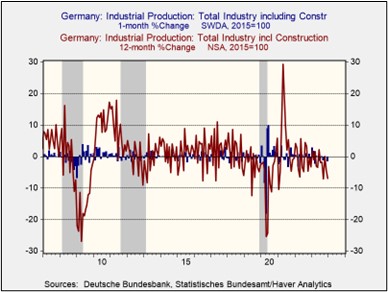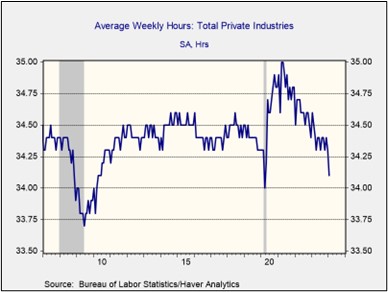Daily Comment (February 7, 2024)
by Patrick Fearon-Hernandez, CFA, and Thomas Wash
[Posted: 9:30 AM EST] | PDF
Our Comment today opens with our thoughts on a troubling new approach to providing aid to Ukraine that Western policymakers are now considering. We next review a range of other international and US developments with the potential to affect the financial markets today, including further weak industrial data out of Germany and a few thoughts about what the troubles at New York Community Bancorp might mean for the broader US financial system.
Russia-Ukraine War: With far-right, populist politicians in the US and Europe opposing more military aid to Ukraine as it tries to fight off Russia’s invasion, one thing we’ve been watching closely is a proposal to channel frozen Russian assets in the West to Ukraine’s war effort. The latest iteration of the idea is a proposal to use the frozen Russian assets as collateral for new allied borrowing to fund additional assistance to Ukraine. Officials say the idea is now the leading option to provide further aid to Kyiv.
- The new proposal clearly stems from a perspective that enabling Ukraine to keep fighting off the Russians is so important that it offsets any negative effects from such a policy. However, we suspect that using frozen Russian assets as collateral for Western borrowing would dramatically increase tensions between the evolving US geopolitical bloc and the China/Russia bloc. When push comes to shove, there would be a high likelihood that Western borrowers would renege on such debt, allowing creditors to confiscate the assets.
- As we’ve written before, tensions between the US bloc and the China/Russia bloc are in a self-reinforcing spiral. Unilaterally pledging Russian assets to Western creditors would almost certainly prompt Beijing, Moscow, and other governments in the China/Russia bloc to further sever their financial ties with the West.
- In such a scenario, we think China, Russia, Iran, and other members of Beijing’s bloc would accelerate their efforts to exit the dollar system and sell off their dollar holdings.
- If the world disintegrates into competing geopolitical, economic, and financial blocs as we think, the loss of efficiency and market competition would likely boost consumer price inflation and inflation volatility, as well as interest rates and interest-rate volatility. As we’ve written before, such an outcome would be especially negative for fixed-income assets. In contrast, equities and commodities would probably provide higher total returns going forward.
China-South China Sea: Illustrating the increasingly belligerent attitudes of some Chinese strategists and academics, a new article by maritime strategy expert Wu Shicun calls for Beijing to stop relying on “restraint and forbearance” in its territorial disputes in the South China Sea. Instead, Wu calls for China to “show our swords when necessary,” essentially declaring that Beijing should threaten military force to counter any pushback against its expansive territorial ambitions.
China: Following Tuesday’s government directive for the “national team” of major financial firms to buy Chinese stocks in an effort to buoy the market, trading prices and volumes continue to surge today. The benchmark CSI index of large, liquid stocks is now up more than 4% for the month, after falling some 6% in January. Separately, General Secretary Xi has replaced the chief of the China Securities Regulatory Commission, further signaling his intent to buoy the market.
Japan: Workers’ nominal cash earnings in December were up 1.0% year-over-year, in part reflecting strong year-end bonuses. That was weaker than the expected rise of 1.4%, but analysts considered it sufficiently strong to support the Bank of Japan’s plan to soon exit its longstanding policy of negative interest rates.
Germany: December industrial production fell by a seasonally adjusted 1.6%, several times worse than the expected decline and far worse than the revised fall of 0.2% in November. With the decline in December, Germany’s industrial output has now fallen for seven straight months, leaving it down 6.9% year-over-year. The declines largely reflect Europe’s current high interest rates and German policies that have crimped energy supplies. Since Germany is Europe’s manufacturing powerhouse, its industrial decline is a big hurdle for the region’s economy.

Argentina: Radical libertarian President Javier Milei and his La Libertad Avanza coalition have pulled their big, omnibus economic reform bill from the floor of the lower house of Congress after accusing opposition lawmakers of reneging on plans to approve the bill. With opposition support, the bill was approved on a first reading last week, but now opposition lawmakers have been voting down key sections in the second reading. Since Milei’s coalition only has a small number of seats, the voting calls into question his ability to push through the reform program.
United States-Guyana-Venezuela: With the Venezuelan government continuing to threaten military force to seize more than half the territory of Guyana, the US this week committed to sell the Guyanese additional fixed-wing aircraft, helicopters, drones, and radar systems. As of this writing, the dollar value of the deal has not yet been made public.
US Monetary Policy: At an event yesterday, Cleveland FRB President Mester said the strong headline numbers in last week’s January employment report masked other signs of moderation in the data and wouldn’t derail the Fed’s plans to cut interest rates gradually over the course of 2024. Mester said she supported the policymakers’ expectations to cut rates three times, leaving the benchmark fed funds rate at 4.50% to 4.75% by year’s end.
- We agree that the details in the January report showed more moderation than suggested by the massive gain of 353,000 in nonfarm payrolls or the year-over-year rise of 4.5% in seasonally adjusted average hourly earnings.
- For example, we note that the standard approach of using seasonally adjusted figures for year-over-year calculations is prone to distortion, since both the current month’s figure and the year-earlier figure could have bad adjustments. Where possible, we prefer to use non-seasonally adjusted data for year-over-year comparisons.
- Our approach suggests average hourly earnings in January were up just 3.9% on the year, moderating from a rise of 4.3% in the year to December.
- Using our approach, annual wage growth is now at its weakest since last May.
- In addition, the report showed that the average workweek plunged to just 34.1 hours in January, down from 34.3 hours in December and 34.4 hours in November.

US Banking System: Following New York Community Bancorp’s announcement last week of a surprisingly large loss, and in the wake of a dramatic selloff of its shares, Moody’s yesterday cut the firm’s debt to junk status. Moody’s now rates NYCB’s debt at Ba2, versus Baa3 previously. Nevertheless, it currently appears that the bank’s problem is limited to profitability, rather than the falling bond values and deposit flight that marked the banking crisis last spring. For now, that suggests the situation at NYCB does not portend another crisis like last year.
- After acquiring Signature Bank during last year’s crisis and a separate bank in 2022, NYCB surpassed the $100 billion in assets that require greater regulatory scrutiny and higher capital standards. NYCB had noted that working through those acquisitions would require it to shore up its balance sheet, and its recent loan write-offs appear to be part of that effort.
- At the same time, NYCB has reported that its deposits have been largely stable, down just 2% during the fourth quarter of 2023. Its share of insured deposits is also much higher than the banks that saw deposit flight last year.
- On the New York Stock Exchange yesterday, NYCB closed at $4.20 per share, down 22.2% for the day and approximately 60% from its level just before the announced loss. Other regional bank stocks were also down yesterday, but not nearly as sharply as NYCB.
US Housing Market: While some private data providers say overall apartment rents have stabilized or have even started to fall, new analysis from Yardi Matrix suggests the reversal in rent inflation has been mostly in the luxury segment, where most of the new supply has come. While overall rent costs grew by just 0.3% in 2023, Yardi says rents for lower- and middle-tier apartments rose 2.0%. Continued increases in apartment rents may be one reason President Biden is struggling to retain the support of working-class voters as he campaigns for re-election.


